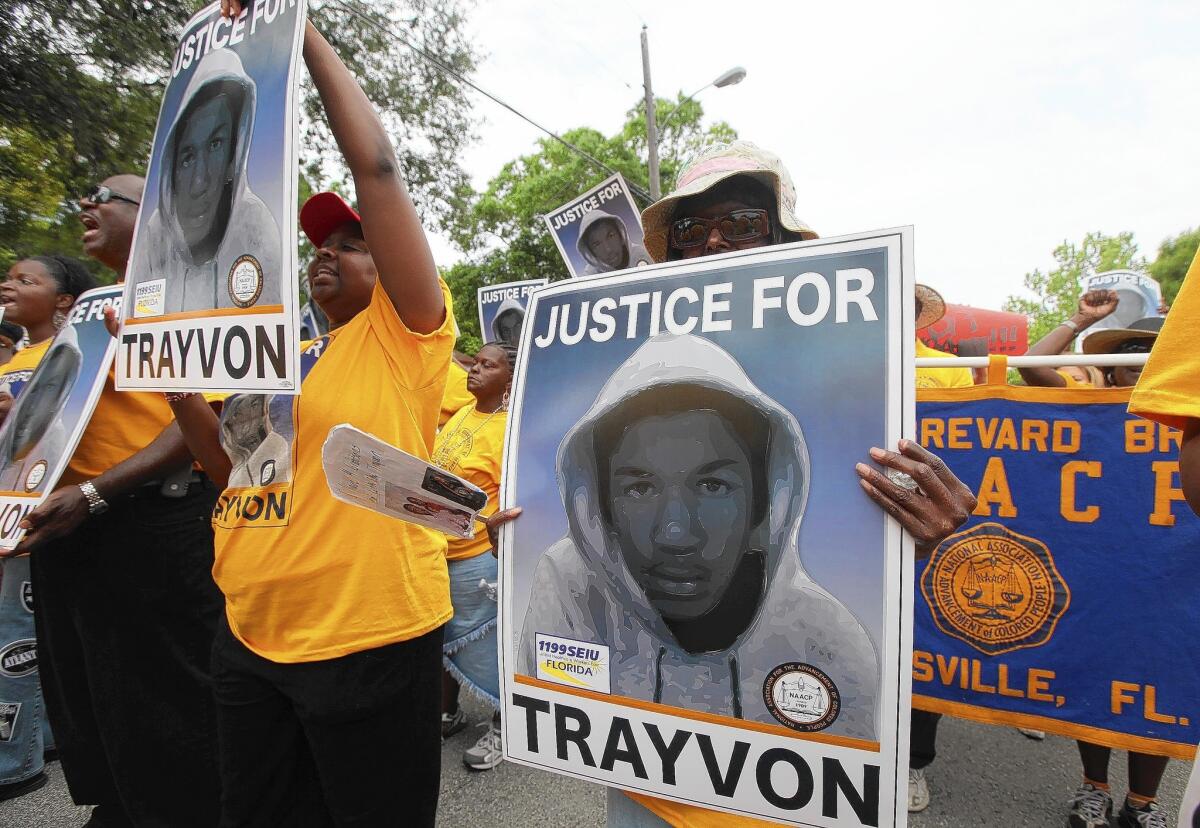Lisa Bloomâs âSuspicion Nationâ dips into Trayvon Martin case

The subtitle of legal pundit Lisa Bloomâs new book, âSuspicion Nation,â is a bit misleading when it claims to be âthe inside storyâ of the killing of Trayvon Martin and the trial that followed.
There are few, if any, behind-the-scenes revelations in âSuspicion Nation.â Anyone who followed the 2013 trial of shooter George Zimmerman will be familiar with Bloomâs account of the case. And in a divided United States, millions followed the story obsessively, joining competing pro-Trayvon and pro-Zimmerman Greek choruses on social media.
Bloom, a Los Angeles atto rney, wrote two previous books, âSwagger: 10 Urgent Rules for Raising Boys in an Era of Failing Schools, Mass Joblessness, and Thug Cultureâ and âThink: Straight Talk for Women to Stay Smart in a Dumbed-Down World,â which offered advice to harried parents and professional women. In âSuspicion Nation,â she unapologetically enters the fray on behalf of the hoodie-wearing teenager Trayvon and against Neighborhood Watch volunteer Zimmerman who shot him in February 2012 and claimed it was self-defense. Zimmerman was acquitted.
At its best, âSuspicion Nationâ is a thorough evisceration of the amateurish job done by the Florida prosecutors who tried Zimmerman. And at its worst, itâs like turning on the television and listening to yet another annoying television pundit make sport of a human tragedy. Bloom is, in fact, a television pundit, in addition to being the daughter of high-profile lawyer Gloria Allred.
Despite âSuspicion Nationâsâ glib and talky writing style, her analysis of the Zimmerman prosecutionâs many missteps is a compelling one.
What were those mistakes? For starters, the prosecutors failed to establish the âunreasonablenessâ of Zimmermanâs fears of Trayvon, Bloom writes. Shooting someone in self-defense is justifiable, according to Florida law, if one has a âreasonableâ fear of death or serious bodily harm. Zimmerman misread the situation because he was overtly prejudiced and was fixated on black youths in his neighborhood, as established by several previous 911 calls, Bloom argues. Inexplicably, the prosecutor did not play those tapes for the jury, despite having won an earlier legal battle to do so.
The prosecution also failed to aggressively point out the obvious contradictions in Zimmermanâs testimony about his confrontation and fisticuffs with Trayvon and the shooting that followed, Bloom argues.
âSomehow, during the presentation of the evidence at Zimmermanâs trial, the prosecution was unaware of the vitally important fact that Zimmermanâs gun was holstered on his backside,â Bloom writes. Thus positioned, it was nearly impossible for Trayvon to have seen it (therefore disproving Zimmermanâs assertion that Trayvon was reaching for the weapon). Most critically, it would have made it impossible for Zimmerman to take the weapon out of his holster if he had been on his back, with Trayvon on top of him, as he told police.
Bloom writes that if the prosecution had conducted a reenactment of Zimmermanâs version of events, he would have been unmasked as a âliar.â
In âSuspicion Nation,â Bloom also argues that two key prosecution witnesses (medical examiner Shiping Bao and Trayvon friend Rachel Jeantel) performed terribly in court because the prosecuting attorneys neglected to conduct any pre-trial preparation with them. The prosecutors also missed an opportunity to attack the credentials of a key defense expert, Dr. Vincent Di Maio, whose testimony on behalf of defendants had been vigorously and successfully picked apart in earlier criminal trials, including the Phil Spector case.
Unlike some pundits, Bloom does not believe that the Florida prosecutors deliberately threw the case. Rather, she thinks they performed poorly because they didnât believe they should prosecute Zimmerman in the first place and did so only after public outrage led Floridaâs attorney general to appoint a special prosecutor.
âPolice and prosecutor had believed Zimmermanâs self-defense story, and neither the outside agitation nor the Special Prosecutor had changed their hearts and minds,â she writes. Their closing arguments, Bloom says, were a disorganized mess that convinced no one.
Unfortunately, Bloom takes some serious arguments and makes her own mash out of them. She opens her book with an interview she conducted of the juror who held out the strongest for a Zimmerman conviction â and inadvertently makes that juror look silly. That jurorâs complaints against her colleagues include, strangely, the fact that they hogged the television remote at the hotel and forced her to watch âGame of Thrones.â
In her dissection of the prosecutors, Bloom uses hackneyed and downright silly writing devices. Among other things, she imagines herself as the prosecutor questioning key witnesses and writes long sections of imaginary testimony â most ending with Perry Mason-style âah ha!â moments.
Nor is she much interested in peering beneath the surface of the national soap opera at the personalities involved. The paranoid Zimmerman is surely worthy of a good character study (especially in light of his repeated post-acquittal arrests), but you wonât find out anything new about him here. Bloom considers Trayvonâs school disciplinary record in a long second section on racial profiling in American society. But she makes no effort to interview anyone who knew Trayvon and who might shed light on the real human being behind the liberal cause cĂŠlèbre.
âSuspicion Nationâ ends with a good if not entirely new discussion of the history of Americansâ obsession with self-defense. But the heart of her book is the encounter in the gated Retreat at Twin Lakes.
Bloom does a good job of telling us why the prosecutors failed to hold Zimmerman to account for his actions that rainy night. But supporters of Zimmerman will surely ignore its arguments. And those who felt Zimmerman was guilty will feel as if theyâd been forced to watch the wall-to-wall television coverage unfold all over again â only to see the story reach the same perplexing ending.
Suspicion Nation
The Inside Story of the Trayvon Martin Injustice and Why We Continue to Repeat It
Lisa Bloom
Counterpoint: 320 pp., $25
More to Read
Sign up for our Book Club newsletter
Get the latest news, events and more from the Los Angeles Times Book Club, and help us get L.A. reading and talking.
You may occasionally receive promotional content from the Los Angeles Times.








